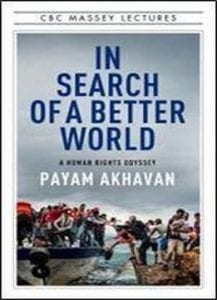
*THIS TRANSCRIPT HAS BEEN CONDITIONALLY PROVIDED BY CM NEWS*
September 28, 2020
TRISH: We here at CM News are pleased to have learned that yesterday, Dylan Langan, one of our newscasters, took to the stand and spoke about the meaning he discovered in Payam Akhavan’s In Search of a Better World.
DYLAN: Thanks, Trish. It has been difficult processing the events of yesterday. Before I begin, I would like everyone to realize that this conflict is still ongoing. Take a moment to read about how religious minorities are still being punished in Iran. Here’s a copy of yesterday’s exercise if you’d like to go back over it: Presentation 1 – In Search of a Better World – Dylan Langan-1foujhc
“Here I was, a Canadian teenager, worried about popularity among my high school friends, while back in Iran, the youth were being killed for writing an essay. It became increasingly difficult to reconcile my mundane concerns with the enormity of what had transpired. (Akhavan, 2017 p.64)”
I felt that reading this book has given me new, concrete meanings to Gerard’s comments from last week’s class. Community Music can enable us to make a difference and embrace tough challenges within our work. It may not always be pleasant, but it is necessary and can make a concrete difference in the lives of both ourselves and others.
I really appreciated the opportunity to share my exercise and findings with the class. I think for the first time, I felt personally touched by a part of the course. I have, for a while, been doubtful and somewhat disenfranchised with popular Western thoughts, behaviors, and materialism (including my own), but in particular I have grown tired of a surprisingly, widely-held ignorance and lack of sensitivity towards others, whether locally or globally. I am frustrated with being given opportunity and freedoms while countless others struggle to survive each day. As Akhavan makes considerable note of within “In Search of a Better World,” every human being deserves fundamental rights and freedoms.
After reading this text, I have asked myself many questions… too many to articulate here. I have included a considerable amount of information below, in the hopes that others may begin to understand the situation in Iran via historical context. I highly recommend you read Payam Akhavan’s book when the dust settles. I’m Dylan Langan, CM NEWS, Waterloo.
TRISH: Thanks DYLAN, now over to LAUREN for more historical details on the conflict Dylan just described, LAUREN?
LAUREN: In 1950, the United States of America signed a 50/50 profit split deal on oil with Saudi Arabia. This deal jump-started an angry popular movement to have Iran’s oil company, Anglo-Persian Oil, nationalized.
In 1951, Mohammad Mosaddegh was appointed prime minister of Iran. Having been educated in Switzerland as a scholar of international law, many argue that the man was incorruptible. He stood for Iran at the UN Security Council, and also at the International Court of Justice at The Hague. He was determined to nationalize the oil company, and assert Iran’s sovereignty from the British through resource and natural wealth development. The United States supported Mosaddegh at this time.
In 1953, after a change in the federal government, the United States took a more aggressive foreign policy to contain the Soviets. Back in Iran, the nation was unstable due to the British blocking Iranian ports. The British finally convinced the U.S.A. to overthrow Mosaddegh to avoid a communist takeover. ‘Operation Ajax’ was the name of the coups d’etat which successfully ousted him- the first of many to be carried out by the United States government. This foreign meddling was flown under the banner of ‘keeping the world safe for democracy’, or as Akhavan points out “at least, safe for corporate capitalism.” The American operation was backed by many religious leaders in Iran, who were fearful of Mosaddegh’s democratic reforms and secular laws. They wished to maintain the old religious policies that they had under the monarchy. It sparked a period of authoritarian rule and massive modernization.
Thus in 1954, Mossadegh was exiled. The shah, the former king of Iran, returned from exile to strike a deal with oil companies from the U.S.A. In 1955, they joined the Baghdad Pact, forming a regional military alliance with the British. To drum up support from well-connected and old religious circles/leaders, members of the Baha’i, a minority religion, were attacked and killed by thousands in angry mobs, after Shia Muslim religious leaders used national broadcasts and local sermons to convince the nation of how the Baha’i deserved to die. Thousands of Baha’i were murdered and many religious buildings were destroyed.
In 1963, the shah announced reforms to land, literay, the right of women to vote, and the right of religious minorities to hold public office. He did not receive a warm welcome from his conservative clerics, who feared the modernization would undermine their traditional powers. Khomeini, a fanatical cleric who, for this action, condemned the shah as a puppet of the U.S.A. and Israel. He claimed that Jews were taking over, in collaboration with the Baha’i. Mobs took to the streets again, demanding the shah’s head: “death to the dictator.”
By 1964, the shah exiled the fanatic Khomeini to Iraq. Despite this, the rule continued as a totalitarian theocracy.
In 1967, Mossadegh passed away.
Turmoil continued all the way to 1983, where tens of thousands were executed to consolidate Kohemini’s totalitarian theocracy. We can see from the above context how Mona, the girl who was punished by imprisonment, torture, and death for her essay regarding freedom, was persecuted so harshly. Her essay represented the beliefs and principles of the Baha’i, a minority religion which had been persecuted for many decades, the harshest of which were during the 20th century. Those who belong to the Baha’i faith are still being punished today.
As Dr. Yun frequently says: follow the money. It is heartbreaking to realize just how much damage the pursuit of money, particularly by the U.S.A. and Britain, has caused the Iranian people.
I’m Lauren Lopet, CM NEWS, Waterloo.
This CM newscast has been brought to you by HUNGRY chocolate bars, because, let’s face it, you’re HUNGRY.

(Seriously, go eat! As a grad student, you are probably missing a meal right now just to get work done. At CMNews, we always say eat and work- it makes the work that much better.)









What bothers me about the experiential stuff is that it always begins with the premise that we don’t know.
I know that, in my case, that is true.
I am bothered because the space of not knowing is traditionally a negative one for me.
I already feel negative/guilty/ashamed about being a well-educated and privileged white man, and the speakers often augment these feelings and have me question my identity.
As I learned from Gerard recently, compassion and empathy for others starts with self-compassion.
I think that these feelings make it difficult for me to be self-passionate.
I feel less valuable when I am in a state of not-knowing.
I think this process, while bothersome, is a good one for me to go through.
After many classes, what we don’t know is kind of an exciting thing for me: “what will I learn today?”
This outlook definitely brightens my perspective, and I have always been happily curious in class. The additional piece is that the aforementioned feelings aren’t as strong anymore.